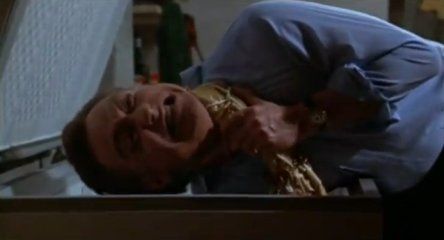Never turn your back on a patient.

More often than not, the weakest part of any given horror anthology tends to be the linking device that is used to get from one story to the next. After all, there are only so many ways to gather a group of strangers together and have them tell each other scary stories before it all starts to get arbitrary. One that managed to put a unique spin on the concept was Asylum, which was made by Amicus in 1972. Written by old hand Robert Bloch, based on four of his short stories, and directed by Roy Ward Baker, the film's home base is Dunsmoor, a private asylum for the incurably insane, where idealistic psychiatrist Robert Powell applies for a job. It's no ordinary interview, though, as the facility's new director (a wheelchair-bound Patrick Magee) turns him over to orderly Geoffrey Bayldon and sets him the task of identifying which of the patients is the old director, who has apparently gone off his or her nut.
In the first segment ("Frozen Fear"), patient Barbara Parkins tells how her married lover (Richard Todd) killed his hateful wife with an axe and hid her in the freezer, all chopped up and individually wrapped. She isn't ready to part with him, though, as Parkins discovers when she drops by to start their new life together. In the second, Barry Morse relates the tale of "The Weird Tailor," who accepts the commission to make a suit out of a weirdly glowing fabric for Peter Cushing, who has very specific instructions for how and when it is to be done. It's a difficult job, but the price is right -- or so Morse thinks.
Next, in "Lucy Comes to Stay," Charlotte Rampling is brought home from the hospital by her brother (James Villiers), only to fall back into her old habits when she finds her stash of little yellow pills and her vivacious friend Lucy (Britt Ekland) appears to spirit her away. Admittedly, it's a bit of a stretch to think that Rampling or Parkins or even Morse could be the director-turned-patient, which just leaves Herbert Lom as the unhinged creator of a platoon of miniature "Mannikins of Horror," one of which bears his own likeness. His story unfolds entirely in the present, though, as Lom targets the universally unloved Magee. As for Powell, he soon finds out that some jobs aren't worth jumping through hoops to get.